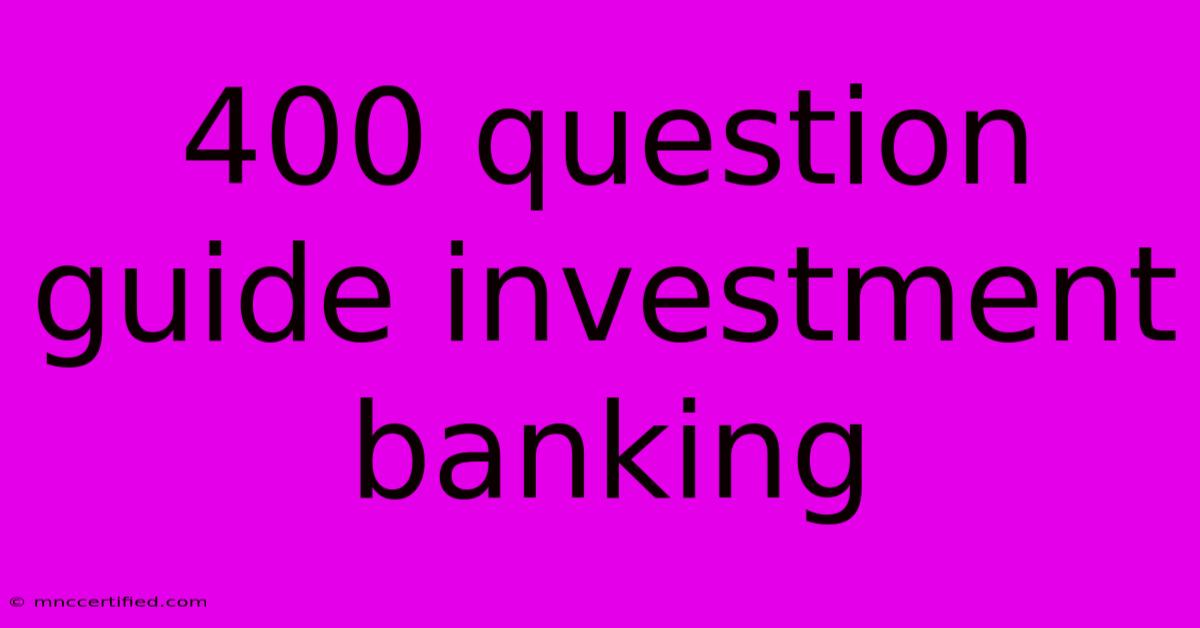400 Question Guide Investment Banking

Table of Contents
Cracking the Code: Your Ultimate Guide to 400 Investment Banking Interview Questions
Landing a coveted investment banking job requires more than just a stellar resume and strong academic credentials. You need to be prepared to navigate the intense interview process, which often includes a barrage of questions testing your knowledge, analytical skills, and understanding of the industry.
This comprehensive guide provides a deep dive into 400+ investment banking interview questions, categorized by topic to help you prepare for any challenge.
Navigating the Interview Landscape
Investment banking interviews are known for their rigorous nature, designed to assess your suitability for a fast-paced, demanding environment. Expect to encounter a variety of question types, including:
- Fit Questions: These focus on your personality, motivations, and interest in investment banking.
- Technical Questions: These test your understanding of financial concepts, valuation methods, and industry knowledge.
- Case Studies: These present real-world scenarios requiring you to apply your analytical skills and make informed decisions.
- Behavioral Questions: These delve into your past experiences, demonstrating how you handle situations and your problem-solving approach.
The 400+ Question Breakdown
Let's explore the key categories of questions you should prepare for:
1. Fit Questions:
- Why investment banking?
- Why this specific firm?
- What are your strengths and weaknesses?
- Tell me about a time you failed and what you learned from it.
- What are your career aspirations?
- What are your hobbies and interests outside of work?
- Why should we hire you?
2. Technical Questions:
a) Financial Concepts & Valuation:
- Explain the different types of financial statements.
- What are the key drivers of a company's valuation?
- Describe the different valuation methods (DCF, Precedent Transactions, Market Multiples).
- How do you calculate a company's free cash flow?
- What are the differences between EBITDA and EBIT?
- What are the main drivers of a company's stock price?
- What is the time value of money?
- Explain the concept of risk and return.
- What are the different types of financial risk?
b) Mergers & Acquisitions (M&A):
- What are the different types of M&A transactions?
- What are the motivations for M&A?
- Describe the different phases of an M&A deal.
- What are the key considerations in evaluating a potential acquisition?
- What are the potential synergies in an M&A deal?
c) Debt & Equity Financing:
- What are the differences between debt and equity financing?
- What are the different types of debt financing?
- What are the advantages and disadvantages of debt financing?
- What are the different types of equity financing?
- What are the advantages and disadvantages of equity financing?
d) Industry Knowledge:
- Describe the current state of the financial markets.
- Discuss recent industry trends and their impact.
- What are the key players in the industry you're interested in?
- Analyze a specific industry or company.
- What are the key risks and opportunities facing a specific industry?
3. Case Studies:
- You are advising a company on a potential acquisition. Analyze the deal and recommend whether or not to proceed.
- A company is considering issuing new debt. Evaluate the impact on the company's financial position.
- A client wants to invest in a new venture. Analyze the market opportunity and advise on the investment decision.
4. Behavioral Questions:
- Describe a situation where you had to work under pressure.
- Tell me about a time you had to deal with a difficult client.
- How do you handle conflict in a team setting?
- Give an example of a time you had to make a difficult decision.
- What is your greatest accomplishment?
- What are your salary expectations?
Mastering the 400+ Questions:
- Practice, Practice, Practice: Rehearse answering common questions aloud and in front of a mirror.
- Research the Firm: Thoroughly understand the firm's culture, recent deals, and industry focus.
- Stay Current: Keep abreast of current events, market trends, and key industry news.
- Seek Guidance: Don't hesitate to reach out to mentors, alumni, or career services for advice and insights.
- Be Authentic: Be yourself and demonstrate your genuine enthusiasm for investment banking.
Building a Strong Foundation:
- Brush up on your financial fundamentals.
- Develop strong analytical and problem-solving skills.
- Practice presenting your thoughts clearly and concisely.
- Develop a strong network within the industry.
- Build your confidence and demonstrate your passion for the field.
The Final Word:
Cracking the investment banking interview is a challenging but rewarding journey. By thoroughly preparing, mastering the key questions, and showcasing your skills and knowledge, you can confidently navigate the process and secure your dream role in the exciting world of investment banking.

Thank you for visiting our website wich cover about 400 Question Guide Investment Banking. We hope the information provided has been useful to you. Feel free to contact us if you have any questions or need further assistance. See you next time and dont miss to bookmark.
Featured Posts
-
Chemical Bonding Crossword Answer Key
Nov 10, 2024
-
Uk Parades Remembrance Sunday 2024 Live
Nov 10, 2024
-
Lafc Clinches Semifinal Spot Bogusz Shines
Nov 10, 2024
-
Dietician Near Me That Take Insurance
Nov 10, 2024
-
Title Insurance Cost In Massachusetts
Nov 10, 2024